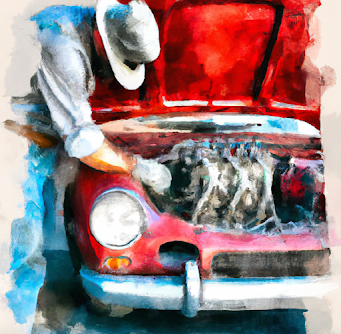The Reliability Dilemma:
One of the most significant downsides of the excessive technology in modern cars is the impact on their reliability. The more complex the systems, the more chances there are for malfunctions and failures. Unlike the simpler vehicles of the past, modern cars are now filled with numerous electronic components that can go awry, leaving us stranded and frustrated. As we'll soon discover, the irony lies in the fact that these intricate systems are often unnecessary and contribute to skyrocketing repair costs.
Lane Assist: A Divisive Companion:
Lane Assist: A Divisive Companion:
Lane assist, a popular feature in modern cars, has gained both praise and criticism. While it can be beneficial during long highway journeys, its usefulness diminishes significantly in rural or winding roads. The constant intervention and alarms can be more of a nuisance than a help, forcing us to fight against the system just to maintain control. Shouldn't driving be an experience where we retain command over our vehicle's movements?
The Illusion of Convenience:
Another example of unnecessary technology is the electronic handbrake, a feature that replaces the traditional manual lever. Sure, it may seem convenient, but at what cost? These systems add complexity and increase the likelihood of malfunctions. Furthermore, they require specialized maintenance and repairs, leading to inflated expenses when something goes wrong. Is the slight convenience really worth the potential headaches and expenses?
Faulty Features:
Faulty Features:
A Comedy of Errors: Personal experiences highlight the unreliability of certain advanced features. Take, for instance, the automatic wipers that activate randomly even when turned off. Imagine driving under the scorching sun, only to have your wipers unexpectedly swipe across your windshield. Such persistent faults not only diminish the driving experience but also reflect poorly on the overall quality of the vehicle. If even the basic features cannot be relied upon, what does it say about the car as a whole?
The Rise of the Overblown SUV:
The Rise of the Overblown SUV:
Massive SUVs have also become a symbol of excess and unnecessary opulence. With their imposing presence, oversized wheels, and extravagant price tags, these vehicles are often seen as an embodiment of conspicuous consumption. They not only consume vast amounts of resources during production but also have a greater impact on the environment due to their weight and fuel consumption. Are these behemoths truly necessary, or do they merely serve to stroke our egos?
Embracing Simplicity:
Embracing Simplicity:
In contrast to the trend of overcomplicated modern cars, there is a growing appreciation for simpler, more reliable vehicles of the past. Many yearn for the days when cars were less burdened by unnecessary technology and more focused on the essentials. Classic models, like the old Defender, exemplify the timeless charm and dependability that seem lacking in their modern counterparts. Perhaps it's time we reevaluate our priorities and consider what truly matters in a car.
Conclusion:
Conclusion:
The overcomplication of modern cars with unnecessary technology and features raises concerns about their reliability and cost-effectiveness. From malfunctioning systems to exorbitant repair bills, the downsides often outweigh the benefits. As consumers, we should demand a balance between innovation and practicality, appreciating technology that genuinely enhances our driving experience while rejecting superfluous features that only serve to inflate costs. Let us celebrate the simplicity
Thanks
Adrian
